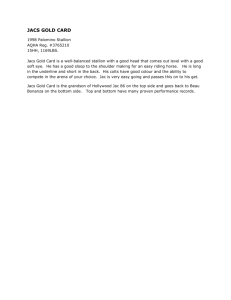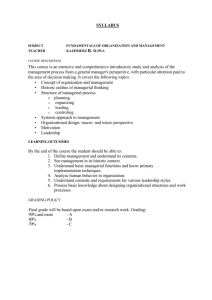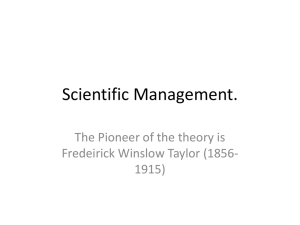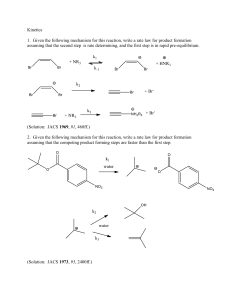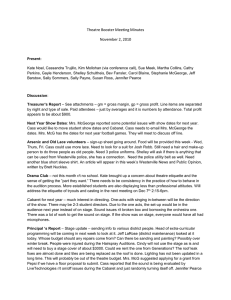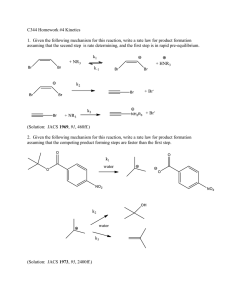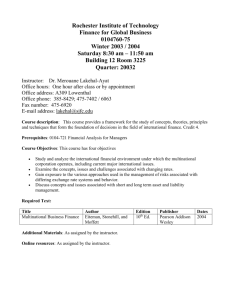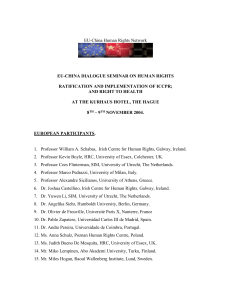update 26/08/2014 - Cass Business School
advertisement
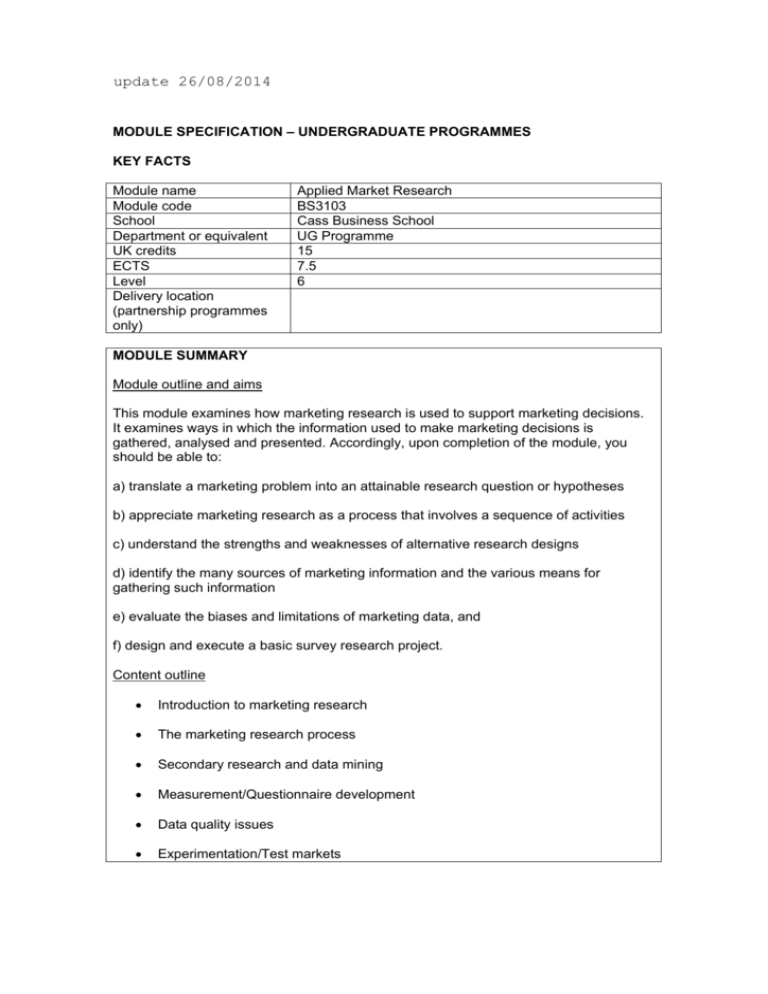
update 26/08/2014 MODULE SPECIFICATION – UNDERGRADUATE PROGRAMMES KEY FACTS Module name Module code School Department or equivalent UK credits ECTS Level Delivery location (partnership programmes only) Applied Market Research BS3103 Cass Business School UG Programme 15 7.5 6 MODULE SUMMARY Module outline and aims This module examines how marketing research is used to support marketing decisions. It examines ways in which the information used to make marketing decisions is gathered, analysed and presented. Accordingly, upon completion of the module, you should be able to: a) translate a marketing problem into an attainable research question or hypotheses b) appreciate marketing research as a process that involves a sequence of activities c) understand the strengths and weaknesses of alternative research designs d) identify the many sources of marketing information and the various means for gathering such information e) evaluate the biases and limitations of marketing data, and f) design and execute a basic survey research project. Content outline Introduction to marketing research The marketing research process Secondary research and data mining Measurement/Questionnaire development Data quality issues Experimentation/Test markets Surveys Online data collection Sampling WHAT WILL I BE EXPECTED TO ACHIEVE? On successful completion of this module, you will be expected to be able to: Knowledge and understanding: Gain an understanding of the scope and nature of marketing research Gain an understanding of the role of marketing research for marketing management decisions Learn how to identify and define managerial and market research problems Understand the marketing research process and distinguish the different stages Gain a better understanding of the different data collection methods used in market research as well as their advantages and limitations Understand the different approaches to the measurement of marketing concepts and the design of questions Understand what is validity and reliability and how they are assessed Learn the different sampling methods and processes used in market research Skills: Identify managerial problems and translate them into market research problems Design a basic market research project Conduct market research by using and combining a variety of market research data collection methods Organise and combine different sources of market research information and use it for the solution of managerial problems Design an effective questionnaire Assess the value of market research information and recognise potential biases Write and present a market research report Separate bad from good market research Select the appropriate market research method and process for the problem at hand Make reasoned inferences from collected information and draw conclusions Values and attitudes: Increase your interest in market research as a business function Realise the inter-relationship between market research and other business functions Appreciate the increasing importance of market research for an organisation operating in the contemporary HOW WILL I LEARN? Lectures, assigned readings, guided class discussions, mini-case studies and other practical exercises. Discussion, role playing and other problem-based exercises, mini-case studies, videotapes, projects. Teaching pattern: Teaching component Teaching Contact type hours Lectures Totals Lecture 20 20 Selfdirected study hours 130 130 Placement hours 0 0 Total student learning hours 150 150 WHAT TYPES OF ASSESSMENT AND FEEDBACK CAN I EXPECT? Assessments Exam, project and presentation. Assessment pattern: Assessment component Examination – 2.25 hours Group Market Research Project Group Presentation Assessment Weighting Minimum type qualifying mark Written 60 0 Exam Written 32 0 assignment, including essay Oral 8 0 Assessment and presentation Pass/Fail? N/A N/A N/A Research Requirement In order to be able to take the exam, students are required to complete a research requirement over the course of the term. There are two alternative ways in which students can fulfill this requirement. 1. The first way is to participate in one-hour of academic research studies. Participating in research is a valuable way for you to receive first-hand experience with marketing research. In addition, your involvement in research will help faculty at Cass Business School continue develop state-of-the-art marketing research -- which is ultimately brought back into the classroom. You will be able to sign up to participate in these studies online at http://cass.sona-systems.com/. You should go to the website and create a user ID as soon as possible, and you will be notified via email from the system when studies are available. 2. The second way to fulfill the research requirement is to write a 1000 word report on an academic research article published in one of the leading journals in the marketing field (a list of journals and the structure to be used for the report are provided). Assessment criteria Assessment Criteria are descriptions of the skills, knowledge or attributes students need to demonstrate in order to complete an assessment successfully and Grade-Related Criteria are descriptions of the skills, knowledge or attributes students need to demonstrate to achieve a certain grade or mark in an assessment. Assessment Criteria and Grade-Related Criteria for module assessments will be made available to students prior to an assessment taking place. More information will be available from the module leader. Feedback on assessment Following an assessment, students will be given their marks and feedback in line with the Assessment Regulations and Policy. More information on the timing and type of feedback that will be provided for each assessment will be available from the module leader. Assessment Regulations Students are required to fulfil the Research Requirement in order to access the written exam. The Pass mark for the module is 40%. Any minimum qualifying marks for specific assessments are listed in the table above. The weighting of the different components can also be found above. The Programme Specification contains information on what happens if you fail an assessment component or the module. INDICATIVE READING LIST MAIN TEXTBOOK McDaniel Carl and Roger H. Gates (2012), "Marketing Research", South-Western. OTHERS INCLUDE Andreasean, A.R. (1985), "Backward market research", Harvard Business Review, MayJune. Diane H Schmalensee et al (1998) How to make research more actionable, Marketing Research, vol.10, no.4 Lawrence D Gibson (1998 ) Defining marketing problems, Marketing Research, vol 10, no.1 Peter R Peacock (1998) Data mining in marketing: Part 1, Marketing Management, vol.6 no.4 Version: 3.0 Version date: March 2014 For use from: 2014-15 Appendix: see http://www.hesa.ac.uk/content/view/1805/296/ for the full list of JACS codes and descriptions CODES HESA Code 133 Description JACS Code N510 Description Business and Management Studies The specific techniques involved in the identification, definition and research of markets for an organisation s products or services. Price Group D Percentage (%) 100


